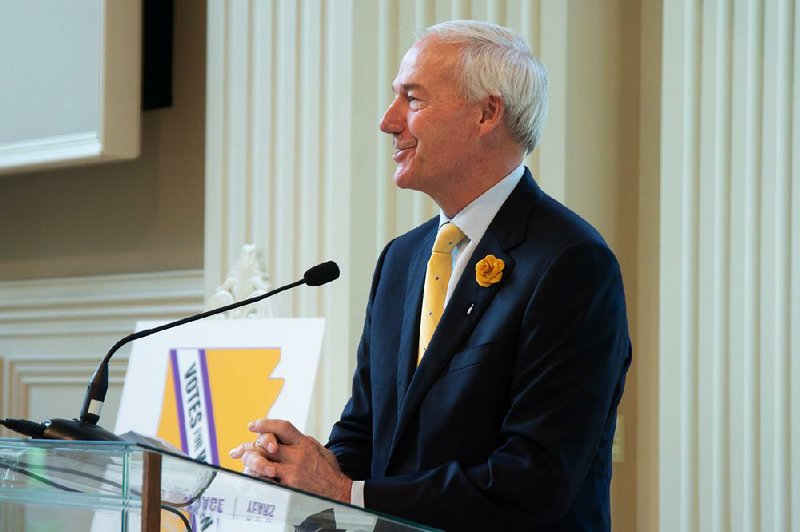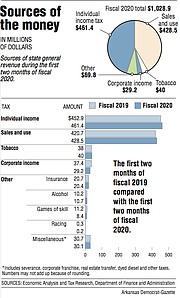Bolstered by rising individual income tax and sales and use tax collections, Arkansas general revenue increased in August by $17.8 million over the same month a year ago to $508 million to set a record for the month, state officials said Wednesday.
The general-revenue collections exceeded the state's forecast by $8.4 million, the Department of Finance and Administration said in its monthly revenue report.
August's total revenue exceeded the previous record of $490.3 million for the month in 2018, said Whitney McLaughlin, a tax analyst for the finance department.
The state's two largest sources of general-revenue collections -- individual income and sales and use taxes -- both increased in August from the same month a year ago and exceeded the forecast.
"The August revenue report continues to be good news reflecting a diverse Arkansas economy with good employment numbers and continued consumer confidence," Gov. Asa Hutchinson said.
"As the year progresses, history reminds us that there will likely be months in which we do not meet our forecast and for that reason we will continue to be cautious in our approach to government spending and our budget," the Republican governor said in a written statement.
August is the second month of fiscal 2020, which started July 1.
During the first two months of the fiscal year, general revenue increased by $6.9 million or 0.7% over the same period in fiscal 2019 to $1.02 billion, outdistancing the forecast by $6.7 million or 0.7%, the finance department reported.
Tax refunds and some special government expenditures come off the top of total general revenue, leaving an amount that state agencies are allowed to spend.
So far in fiscal 2020, the net has increased by $8.4 million, or 0.9%, over the first two months in fiscal 2019 to $911.8 million, which is $7.5 million, or 0.8% above forecast, according to the finance department.
This fiscal year, the general-revenue budget totals $5.75 billion -- an increase of $124.1 million over last year's budget -- with most of the increase targeted for human services and education.
The state's coffers are benefiting from historically low unemployment rates.
Three weeks ago, the state reported that Arkansas' unemployment rate dropped to an all-time low in July, as the state continued to see steady job growth. The rate fell for the third-consecutive month to 3.4% in July, according to information from the U.S. Department of Labor released by the Arkansas Department of Workforce Services. The U.S. unemployment rate was 3.7% in July.
AUGUST FIGURES
According to the finance department, August's general revenue included:
• A $12.1 million, or 5.6%, increase in individual income-tax collections over the same month last year to $229 million, which exceeded the forecast by $2.8 million, or 1.3%.
Withholdings, the largest category of individual collections, increased by $9.3 million over the same month a year ago to $212 million, which exceeded the forecast by $500,000.
"We are seeing the economy here," said John Shelnutt, the state's chief economic forecaster.
• An $11.6 million, or 5.5% increase in sales and use tax collections over August a year ago to $222.8 million, which outdistanced the forecast by $6.3 million, or 2.9%.
This increase in those collections reflected a rebound after two months of fairly weak retail collections and "a slight uptick" from a new law that requires Internet retailers -- defined as out-of-state sellers without a physical presence in the state -- to begin collecting and remitting sales and use taxes on purchases, according to state officials.
Act 822 of 2019 went into effect July 1. This is the first monthly revenue report to show the effect of the law because retailers remitted their taxes to the state in August.
"It's approximately $5 million of new money," Shelnutt said. "We already had $1.9 million in the forecast for the month, and it may be less of a gap over the next few months because some of them already started collecting last year."
State officials have projected Act 822 will raise $32.4 million more in overall state revenue, including $21.8 million in general revenue, in fiscal 2020.
• A $2.5 million, or 37.9%, decline in corporate income tax collections to $4.1 million, which fell $800,000, or 15.7%, below forecast.
Corporate collections fluctuate each month and often are driven by corporations' federal tax strategies.
CASINOS, HIGHWAYS
August is the first month in which the Oaklawn Racing Casino Resort in Hot Springs and Southland Gaming and Racing in West Memphis are paying a lower tax rate based on casino revenue, under Amendment 100 to the Arkansas Constitution, approved by voters in November 2018.
The August report showed a $3.1 million, or 54.9%, drop in gambling tax collections to $2.5 million, which outdistanced the forecast by $200,000 or 10.1%.
Amendment 100 allowed Oaklawn and Southland to expand from offering electronic games of skill to operate as full-fledged casinos. The amendment also authorizes new casinos in Jefferson and Pope counties, with the approval of local officials.
State officials expect to take in $31.2 million in fiscal 2020 in casino tax revenue -- down from $69.7 million in fiscal 2019 -- but projections say that figure will grow to $52 million in fiscal 2021 and eventually to $74.4 million by fiscal 2028.
Under Act 416, the state Department of Transportation will be guaranteed a minimum of $35 million a year from casino-related gambling taxes, a restricted reserve fund and other sources. The restricted reserve fund now has a balance of $42.2 million, said Scott Hardin, a spokesman for the finance department.
Casino tax revenue would provide $20.8 million to the Department of Transportation in fiscal 2021 and the funding would gradually grow to $43.2 million in fiscal 2028 based on projections.
Hutchinson's plan also will levy a new wholesale tax on gas and diesel fuel, which is projected by state officials to raise about $58 million a year for state highways, and increased registration fees for hybrid and electric vehicles to raise about $1.9 million a year. The new tax and fee increases will go into effect Oct. 1.
In total, the governor's plan is projected to raise about $95 million a year more for the Department of Transportation and about $13 million more a year apiece for cities and counties.
INCOME-TAX CUTS
On Jan. 1, 2020, the first stage of the governor's plan to reduce the top individual income-tax rate over two years takes effect.
Act 182 of 2019 cuts the top rate of 6.9% to 6.6% on Jan. 1, and then to 5.9% on Jan. 1, 2021. State officials project it will reduce revenue by $25.6 million in fiscal 2020, $48.5 million in fiscal 2021 and then $22.9 million in fiscal 2022.
In 2015, the Legislature enacted the governor's plan to cut taxes for people who make between $21,000 and $75,000 a year in taxable income. That plan was projected to cut revenue by about $100 million a year.
In 2017, the Legislature approved Hutchinson's plan to cut tax rates for people who make below $21,000 a year in taxable income. That plan is projected to reduce revenue by $50 million in fiscal 2020 and each year thereafter.
Metro on 09/05/2019

